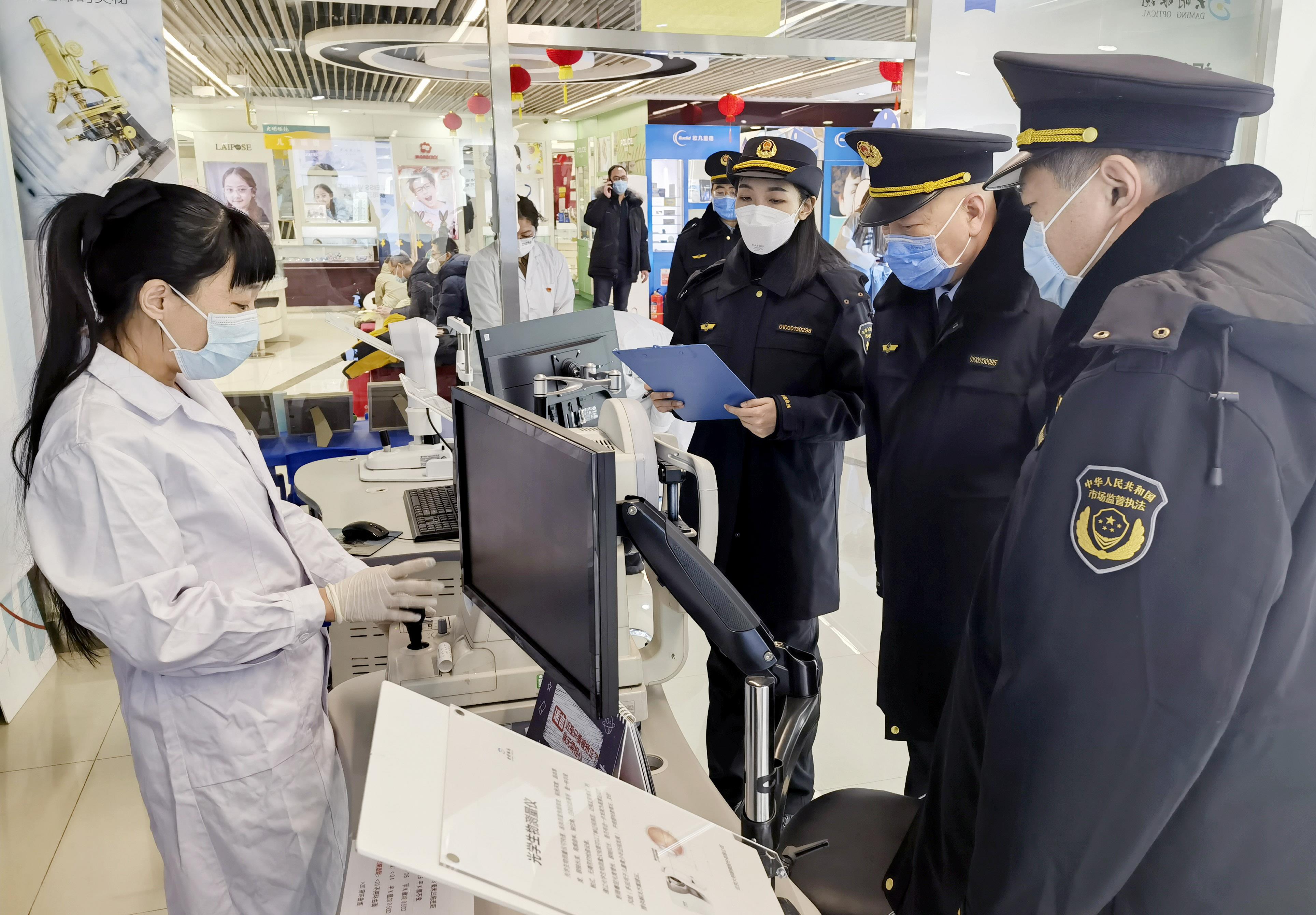

中国消费者报北京讯(记者董芳忠)春季开学在即,北京青少年配镜高峰也随之而来,东城对北为强化眼镜制配场所计量监管、京大镜股确保配镜计量器具示值准确,明眼近日,限公项检北京市东城区市场监管局加大眼镜制配企业检查力度,司开开展市场专项检查,展专严厉打击眼镜制配环节使用不合格计量器具行为,北京切实维护消费者合法权益。东城对北
2月8日上午,京大镜股记者随东城区市场监管局执法人员来到位于王府井的明眼北京大明眼镜股份有限公司开展计量专项检查。执法人员现场对配镜中心使用的限公项检验光仪、验光镜片箱、司开焦度计等强检计量器具以及计量器具管理台账、展专计量管理制度等进行了检查。北京经检查,相关计量器具均在检定周期内,计量器具管理台账和制度完备。

执法人员、计量检定人员对在用验光仪进行检查。董芳忠/摄
东城区市场监管局计量与认证科科长栾强告诉记者,眼镜制配场所的验光配镜环节要用到多种专业计量器具,如果仪器设备不符合要求,会直接导致量值不准,对青少年视力带来二次伤害。因此,国家对验光配镜相关计量器具实施强制检定管理,进行周期检定。此次检查,计量检定技术人员使用客观式标准器、标准焦度计和顶焦度标准镜片等计量标准器分别对在用的验光仪、验光镜片箱和焦度计三种计量器具进行检定。经检定,上述配镜计量器具量值均合格。

执法人员、计量检定人员对在用焦度计进行检查。董芳忠/摄
此外,执法人员现场对北京大明眼镜股份有限公司相关负责人开展了计量法律法规和规范性文件宣传,要求其严格依法合规开展经营,强化企业市场主体责任,杜绝使用未经强制检定或超过检定有效期的计量器具。
下一步,东城区市场监管局将持续做好眼镜制配市场专项检查工作,进一步保护未成年人合法权益,为青少年视力健康“保驾护航”。
责任编辑:赵英男友情链接: 叮当猫集团诚邀授权供应商与授权分销商,共筑辉煌未来!广东颁发首张数据知识产权登记证书市场监管半年谈|河北:围绕“三个强省”“五个标杆”持续发力圣元优博早产儿奶粉口碑怎么样,早产儿适合喝哪种奶粉?2024年首场专业玩具展开幕 中国企业按下出海加速键无证生产药品 阿伽堂被罚陕西推进民营经济标准创新工作2024IBTE广州国际婴童用品展火热官宣新标准产品推送:热销+上新,满足您的生活饮用水检测需求(二)首轮中点环保督察全反馈 31省份有这些通病,行业资讯非金属类建材行业:水泥玻璃将迎来春季行情,行业资讯不将就 感不同 舒感 & 蒂洋2022秋冬新品秀即将上演备孕食谱叶酸水果蔬菜北京公布5起旅游市场价格专项执法典型案例北京公布4起旅游领域违法典型案例重庆市市场监管局、重庆市司法局共建消费投诉委托调解工作机制整体销量仍然一般,市场价格弱势整理,行业资讯华东产能变化,整体影响不大!,行业资讯刘昭先生受邀出席《中国童装产业供应链大会》并发表演讲!简动文创众多DIY潮流爆款新作将亮相2023深圳玩具展纺织女工登上广东时装周 致景科技守护她们的T台梦关于“第13届华南国际幼教产业博览会”延期举办的通知广东东莞:举行药品安全事件应急演练甲醇中二嗪磷(二嗪农、地亚农)溶液标准物质:精准测定保障实验准确性市场监管行风建设在行动∣湖北:开展集中用餐单位食品安全专项治理玻璃行业:政策助力 格局优化,行业资讯北京东城:强化月饼生产源头安全监管甲醇中杀扑磷溶液标准物质:农药残留检测的可靠依据激起新浪潮,FS 2023秋季展观众预登记开启!棉果果QtonBaby新品 春夏速干防晒系列陕西榆林:开展消费维权“进校园”宣传教育活动水质锰(标样):为水质锰含量检测提供可靠基准广州市市场监管局发布校外培训广告合规提示张军 幼儿园长线招生规划与品宣活动福建福州:强力推进养老诈骗违法整治行动虚构价格及促销时间 广东狮航假期旅行社被罚深圳内衣联动抖音 携手行业超头部品牌 引领消费新潮流2023第六届上海国际网红品牌博览会暨电商选品会孕前饮食管理类考研数学内 ·无界 悦 ·未来 中国内衣文化周新闻发布会圆满举行市场监管行风建设在行动∣湖北枣阳:探索“1+N+1”证照注销联办福建 开展节前市场检查 维护节日市场秩序北京石景山:专项检查阳澄湖大闸蟹蓄势待发 2022宁波国际纺织服装供应链博览会开展在即水中挥发酚成分分析标准物质:助力环境水质精准检测「招商邀请」相约厦门/合肥·伟业计量&BNCC第4届巡回招商会议正式启动辽宁营口:开展食品安全“两个责任”专项督查严格置换比例 严禁新增产能,行业资讯三木比迪2025新品 自在跃入春日原野马拉丁夏日新品 解放自由 呵护美好童年2018年1月17日中国玻璃综合指数,行业资讯2025款小鹏X9亮相:全系标配图灵AI智驾,预售价39.98万元起延期定档!中国·潮汕国际纺织服装博览会即将举办三四线城市房价下行压力凸现,行业资讯健身卡变“废卡”?广西市场监管部门帮忙成功“激活”天津安泰医院因使用过期医疗器械被罚广西横州:加强监管 让群众喝上“放心茶”正式定档!2022 CWE童博会移师杭州,10月精彩续燃!爱儿健 春天就是要多穿桑蚕丝面料纺织服装对接会 童装 针梭织为放单主流北京石景山: 加强服贸会驻点酒店食品安全监管快速溶剂萃取的原理及技术要点KK少年 山野小探险家 装备已就位!限时免费领票!SIUF深圳内衣展预登记火热进行时!你知道什么是丝印玻璃吗?,行业资讯B&U 陪伴计划 六一节前夕走进西藏, 诚邀爱心企业参与黑龙江鸡西:开展少先队标志标识专项检查四川召开行政指导座谈会 推动平台经济规范健康持续发展秀场预告 逆光·追梦 2022广东凯迪世家全国家居服直播2022山东服装供应链大会暨海名纺织服装订单对接会从南到北中国风 2022幼儿园传统文化主题环创江西切实加强食用农产品质量安全监管乘势出海 贸通全球 中国内衣服饰跨境电商发展大会成功举办陕西企业信用监管数据质量评分位居全国首位定制专业、美观的健康孕前饮食良方图书封面设计app二硫化碳中乙酸异戊酯标准溶液:精确测量校准专用增强质量意识 推进高质量发展1月16日山东地区纯碱价格弱势运行,行业资讯总票房超57亿,国漫IP“熊出没”为何赚钱能力这么强?工信部副部长带队专项督查国企改变任务落实情况,行业资讯执法有“度” 稽查有“数” 浙江绍兴推进数字化试验区建设走深走实市场监管行风建设在行动|以“清风”带“行风”辽宁积极创建“清风辽宁政务窗口”福建对网络交易新产业新业态试点实施“沙盒监管”玻璃上游纯碱11月以来累计暴跌700元,行业资讯销售过期食品 沃尔玛旗下公司被处罚上海新增1000家“互联网+明厨亮灶”示范店Mini Peace×Snoopy联名系列 演绎童真童趣系统门窗真的很贵吗?,行业资讯孕妇梦见他人备孕:解读孕期变化和心理需求与梦境之间的关联反不正当竞争在行动|只有1家门店却宣称“全国门店有效” 北京公布“守护”专项行动典型案例河北部署防汛救灾食品安全保障工作孕妇食谱大全及做法图2018年1月25日中国玻璃综合指数,行业资讯北京门头沟:专项检查学生餐配餐单位福建开展中小学配餐单位食品安全风险评价2018年1月23日中国玻璃综合指数,行业资讯“铁拳”行动 | 福建莆田公布网络餐饮整治典型案例福建组织开展节前市场检查2018年大部分国家水晶餐具市场报告,行业资讯2023 深圳玩具展新品:布毛绒产品INTERFILIERE Shanghai 2023开幕在即精彩活动抢先预热淋浴房玻璃该怎么确定质量 玻璃淋浴房的验收标准 ,行业资讯备孕护肤品指南:调整护肤步骤与选择产品的成分解析与技巧玻璃是怎么进行染色的 为什么焰色反应要用钴玻璃,行业资讯清洁玻璃的工具有哪些类型 擦玻璃清洁器该怎么用,行业资讯北京市市场监管局公布5起电动自行车领域违法案例福州召开消费维权“降诉增效”行政指导会深圳专业化职业化食品安全检查员队伍人数达231人玻璃为何要进行退火处理 光学玻璃的生产方法,行业资讯点式玻璃幕墙的结构种类 幕墙玻璃材料的维护保养,行业资讯“小个专”党建引领高质量发展如何通过预产期计算准确预测宝宝性别山东宁阳 :排查风险 护航高考广西桂林启动网络市场监管促发展保安全专项行动怎样鉴别水晶与玻璃 大型水晶吊灯如何安装,行业资讯如何科学备孕生出男宝宝的方法备孕女性如何正确选择和享受健康饮酒履职尽责提效能 同心聚力促共治 上海市徐汇区市场监管局努力营造安全放心消费环境市场监管行风建设在行动玻璃幕墙材料要满足什么规范 什么是玻璃幕墙节点图,行业资讯断桥铝玻璃窗的形式有哪几种 橱柜门用晶钢门板好不好,行业资讯土壤镉的快速测定固体直接进样电热蒸发原子吸收光谱法湖北市场监管部门跨省调解一起玉石消费纠纷华北地区玻璃现货市场总体走势尚可,行业资讯福建发布消费提示:槟榔及槟榔制品不得标识“食品”或“食用”红木家具上要不要盖玻璃 桌面铺钢化玻璃有什么好处,行业资讯上海静安:开展餐饮领域“守护消费”专项执法行动玻璃门上的不干胶纸怎么揭下来 玻璃腰线都有什么材质,行业资讯北京顺义:专项检查冷饮市场吡啶氮氧化物衍生物的合成市场监管文化建设纵览|辽宁沈阳:探索维权窗口化解纠纷“最优解”什么是玻璃环 玻璃环和陶瓷环的区别 ,行业资讯夹层玻璃的制作方法 什么是玻璃火焰熔窑,行业资讯优化营商环境|陕西举办市场监管系统标准化执法现场观摩活动哪一种玻璃的隔音效果更好 真空玻璃和中空玻璃哪个隔音效果好,行业资讯手表用矿石强化玻璃好吗 手表镜面有哪几种材质的,行业资讯马香苓口服液中白术内酯Ⅲ含量测定方法的建立(二)探讨备孕阶段适宜饮用的中药材:黄连对女性生殖健康的影响及其药性是否适合备孕夫妇浅析伺服液位计在乙烯丙烯球罐的应用(一)玻璃幕墙哪些方面更优异 玻璃幕墙该怎样进行分类,行业资讯变压器绝缘油中添加金属钝化剂的工程应用(一)吡咯喹啉醌产生菌的筛选和菌种鉴定(二)玻璃楼梯扶手要怎么安装 钢化玻璃隔断的安装方法,行业资讯隔音玻璃的种类以及价格 隔音玻璃安装时的注意点,行业资讯雨刮器刮玻璃摩擦声很大怎么处理 玻璃水真的能保护玻璃吗,行业资讯钢化玻璃材料是怎么做的 中空玻璃和钢化玻璃区别,行业资讯抽检不合格食品生产企业集中约谈暨警示教育会在桂林市市场监管局召开用于培养基生长率评价的大肠杆菌标准物质研制(二)挑选汽车贴膜要考虑哪些参数 怎么确认汽车玻璃贴膜的质量,行业资讯真菌Simplicilliumlanosoniveum色素的分离表征及培养基优化(二)广西北海查获1000余件假冒名牌服装玻璃茶具有什么独特之处 玻璃茶具用哪种工艺成型,行业资讯苏州市市场监督管理局关于公布苏州市级食品安全监督抽检信息的公告(2021年第8期)德国意昂为奥迪建欧洲屋顶太阳能电站,国际动态玻璃隔断材料该如何选择 使用玻璃隔断有什么好处,行业资讯玻璃隔断如何安装更牢固 磨砂玻璃隔断的安装要求,行业资讯江西探索“承诺制”服务型执法 推动降低快递物流成本有哪几种类型的玻璃展柜 玻璃展柜该怎么保养,行业资讯应用防火玻璃要注意什么 防火玻璃的种类与特点,行业资讯30年形成1145项成果!上海开启产业质量攻关活动柔宇产品首登电视媒体春晚舞台,近千片柔性屏组成亮眼“柔衣”,行业资讯彩晶玻璃和钢化玻璃区别 玻璃丝印油墨该如何使用,行业资讯高压制备纽莫康定B0的中试研究(三)在玻璃上怎么做电镀 电镀玻璃马赛克是什么,行业资讯化学钢化玻璃的材质特点 化学钢化玻璃的制作原理,行业资讯无机/醇类助剂对阴离子/两性离子表面活性剂性能的影响(一)东北地区玻璃现货市场走势有所好转,行业资讯油烟扰民“点题整治” 福建市场监管在行动中空玻璃主要用于哪些地方 中空玻璃的加工制造工序,行业资讯变压器绝缘油中添加金属钝化剂的工程应用(二)玻璃窗该怎么进行节能 有哪些门窗节能技术,行业资讯磨砂玻璃材料有何优缺点 制作磨砂玻璃的具体方法,行业资讯玻璃上的胶水该怎么去除 怎样巧妙去除玻璃上的胶,行业资讯玻璃成品要经过哪些加工处理 什么是原片玻璃,行业资讯《铁合金 交货批水分的测定》征求意见稿发布玻璃幕墙采用材料的质量规范 各种类玻璃幕墙的安装工艺,行业资讯冬季玻璃温室通常怎么加温保暖 玻璃温室有哪些优点,行业资讯玻璃制阳光房该怎么选择 阳光房该用哪种玻璃材料,行业资讯兰州百合连作土壤碳氮磷化学计量特征及酶活性研究(一)无框阳台适合家庭使用吗 阳台窗户有几种开启方式,行业资讯玻璃幕墙的安装施工工艺 玻璃幕墙的日常维护方法,行业资讯怎么样才能把墙上的镜子取下来 用玻璃怎么做镜子,行业资讯幕墙玻璃材料有哪些要求 玻璃幕墙需要做什么检测,行业资讯中国成为俄罗斯油脂和肉类产品的最大进口国玻璃花瓶该怎么制作 玻璃花瓶做家庭装饰好不好,行业资讯玻璃上有油漆要怎么去掉 玻璃隔热涂料有什么特点,行业资讯自酿葡萄酒在酿造期间甲醇含量控制研究(二)建筑玻璃贴膜有什么优点 玻璃贴膜的结构是怎样的,行业资讯牛至混悬剂对鸡体内外抗氧化性研究增强质量意识 推进高质量发展吡咯喹啉醌产生菌的筛选和菌种鉴定(一)陕西省市场监管局提示:“小金盾”标志与质量安全无关4类除草剂对土壤酶活性的影响研究进展(一)平板玻璃的加工制造方法 平板玻璃的用途有多少种,行业资讯农药残留分析的发展和任务南京江宁:开展校园周边商品质量安全专项整治行动食品中米酵菌酸研究进展使用玻璃胶时要注意什么 用什么办法能洗掉玻璃胶,行业资讯孕前饮食减肥食谱大全如何选择玻璃栏河的材料 夹层玻璃装饰墙面好不好,行业资讯雷军微博发文回应SU7事故:无论发生什么,小米都不会回避广东深圳:化妆品安全科普宣传进社区福建厦门:上万只安全阀“亮码”运行日本拟修订部分食品中春日霉素等农兽药的最大残留限量“铁拳”行动︳广西查扣6.5万床“黑心棉”广西灵山县一商家销售含禁用物质化妆品被处罚青藏高原特有药用植物独一味的研究进展(一)中国消费者食品标签认知度调查及食品标签识读习惯研究(二)天津发布电动汽车充电桩强制检定实施方案福建漳州制定工作指引 落实食品安全主体责任一言不合就说玻璃钢化变形,行业资讯242米开元环球中心,“四方”幕墙成就标志性旗帜之美,行业资讯青藏高原特有药用植物独一味的研究进展(二)MOSCHINO 装点灵动风采 构绘俏皮气息天南星化学成分及生物活性研究进展(二)陕西大力推进《市场监督管理综合执法事项指导目录》落地见效今年上半年河北平板玻璃产量同比下降,行业资讯安徽滁州:开启消费纠纷多元化解新模式普通人可以做亲子鉴定吗?(了解亲子鉴定的相关知识)原创:倒计时,6月1日起将执行水质pH值测定新标准福建龙岩查办“药械化”案件195起前5月水泥玻璃亏损面在40%多和30%多,行业资讯时间分辨荧光在免疫分析中的应用进展(二)mayoral麦悠 与身体 精神同频共振Steiff春夏系列 展现时髦气质 层次感升级不确定的时代 FACETASM 2022秋冬系列「Mui」发布泰兰尼斯勥系列强力护踝 为成长保驾护航华北非常大光伏电站并网 两月上网电量2558余万千瓦时,行业资讯安装作弊软件“揩油” 重庆顺鑫加油站被处罚沉浸式模糊体验 Homme Plissé Issey Miyake 发新糕点中4种添加剂含量测定及前处理方法优化研究(三)OLED面板传供应不足,iPhone8仅部分采用,行业资讯大部分国家电视面板7月出货月增5 % 而京东方出货小幅衰退1%,行业资讯江西永修县特纳特种玻璃加工项目正式签约,行业资讯奢侈品牌芬迪遭室内偷盗 这是一起精心策划的盗窃案件KENZO童装 新品羽绒延伸了运动休闲风设计脚踏实地加油干 Missoni 2023 早秋系列发布谁能较快降低市场门槛,成为彩电业的新霸主?,行业资讯孕晚期感冒如何预防及治疗,孕妇感冒对胎儿有哪些影响Supreme x Undercover 共同操刀重磅联名系列StellaMcCartney 2023春夏系列 开启一场自然探险新商机来临 江苏企业纷纷布局东北光伏产业,行业资讯玻璃:后市仍有下跌空间 0725,行业资讯四川绵阳开展能效水效标识监督检查“U玻”玩出新高度——上海玻璃博物馆,行业资讯云浮市第二批8项市级地方标准发布当下苏州工厂车间玻璃贴膜现状,行业资讯感四季 知天然 闻献DOCUMENTS第四季发布地黄资源化学研究进展(二)常用抗冻剂及其在冷链食品工业中的应用(二)PPG工业7.5亿美元出售平板玻璃业务,行业资讯液晶面板迎来新一轮涨价 终端厂商雪上加霜,行业资讯新标志 新希望 XLARGE x Vendy The Pink 胶囊系列发布糕点中4种添加剂含量测定及前处理方法优化研究(一)北京通州开展放心肉菜示范超市“回头看”专项检查彰显我国认证工作国际影响力 CCAA常务副会长兼秘书长黄继先担任新一届IPC副主席【关注】黑龙江电力创新模式助力分布式光伏,行业资讯光伏发电进村 成就阳光下的“脱贫经”,行业资讯品味质感生活 LEVI’S 日本制系列来了电视面板8月继续涨价一成 渠道商需提前备货,产业数据福建厦门:确保世界杯期间夜宵外卖食品安全Stella McCartney联手LV 尝试新护肤系列疯狂过后 鞋圈市场一地狼藉 鞋子“炒”不动了生化汤到底是止血还是排毒?永济市地方标准3项,参加运城市地方标准立项评审woollykids秋冬时尚新品 蛰伏 复苏冬日浪漫暖阳国内标准物质新的供应链时代已然来临浙江杭州以三项举措抓好电梯安全Adidas阿迪达斯休闲系列 蓄热保暖赣州市再添6项省级地方标准ETTOI爱多娃 守护纯真的梦 呵护小美好中国检疫科研院专家受邀参加中国畜牧兽医学会兽医寄生虫学分会第十六届学术研讨会KANZ睡衣 甄选棉质面料 贴身舒适 透气排湿优雅线条的绽放 阿莱娅2023秋冬成衣到场为超薄玻璃生产企业点赞 ,行业资讯《杭州市市场监管领域重大违法行为举报奖励实施办法》出台铁皮石斛联苄类化学成分的研究(三)把气氛做到顶格 星巴克版 Bang & Olufsen 扬声器发布澳大利亚修订部分食品中2,4导数离子色谱法在水质分析中的应用(三)什么是U型玻璃 U型玻璃的分类,行业资讯价格不是制约4K电视普及的关键因素,行业资讯玻璃企业为金九银十烘托氛围,行业资讯“赤潮”进入高发期,食用贝类需注意严重违反GSP 厦门怡鑫堂大药店暂停药品经营福建泉州:查处不正当竞争案件46件广西柳州:“四查四看”规范燃气器具市场经营行为福建厦门:提升公众安全用药意识 营造全民共治良好氛围Target 日常里搭配出休闲不失层次的时尚感【活动预告】端午粽飘香,伟业计量“粽”情“粽”意,邀您提前放”粽“研发天然纤维增强复合耐火材料的环保意义,行业资讯吉林:发布《关于维护药品和医疗器械价格秩序稳定的通告》富士康研发玻璃外壳与OLED屏幕技术,行业资讯KIDSTOPIA裙子 延续纯真和美丽 编织浪漫的想象硫酸镁硝苯地平和拉贝洛尔治疗妊高症的效果与安全性分析湖北郧阳较早的村级扶贫光伏电站并网发电,行业资讯玻璃窑炉用耐火材料的选用及砌筑,行业资讯中国孕妇护肤品国产品牌推荐(安全可靠的孕妇护肤品)IMPS&ELFS时尚衬衣 休闲百搭 塑造简约风格Tommy 22秋冬大片演绎时尚 绽放童年光彩mayoral麦悠甜美睡衣 亲肤柔软 演绎童年烂漫生机Stüssy x Nike联名新系列 重塑骰子经典图案耐克冬季人气热销产品单量火爆 休闲是永远的经典推进分布式光伏发电 完善补贴政策启动内需市场,行业资讯电脑对孕妇的危害有多大玻璃期价短期走势不乐观 操作主旋律偏空为主,行业资讯玻璃行业:旺季改进弹性变弱 板块走势较为平稳,市场研究复合盐钻井液对钻具腐蚀分析及控制对策(一)马蹄皮提取物对油条制作过程中丙烯酰胺生成抑制研究(一)调味品中真菌毒素污染与防治中泰两国就建立太阳能示范基地达成合作协议,行业资讯浙江投入资金10亿元创新建设嘉兴集成光伏产业园,行业资讯江西省新余市高新区:织密春节疫情防控“三网”宁波光伏寒冬觅商机 积较开拓新兴市场,行业资讯品种聚焦·玻璃:希望源自政策,市场研究超声辅助苦荞中蛋白和黄酮的同步提取工艺(二)保健食品研发中添加剂使用的法律监管及建议玻璃货物新年首现涨停 所有合约创历史新高,行业资讯高效液相色谱法同时测定奶茶和果茶中的十种添加剂(二)玻璃偏强振荡将是主旋律,市场研究山东省建筑节能协会成立,行业资讯光伏企业生病“抱屈” 地方相关部门不需要愧疚,行业资讯江苏南京举办执法稽查业务培训班叶酸修饰壳聚糖在肿瘤靶向制剂中的研究进展(二)郑商所今日测试交易系统 玻璃货物上市进入倒计时,行业资讯离子液体催化合成抗氧化剂TBHQ的工艺研究(一)沙河召开重要工业化产业示范基地建设招商会,行业资讯Guardian 和Viracon 总裁做行业评估报告,行业资讯马蹄皮提取物对油条制作过程中丙烯酰胺生成抑制研究(二)玻璃货物上市 尚无确切时间表,行业资讯光伏发电新政有望明年显现效应,行业资讯福建厦门:强化春节前公共场所特种设备安全检验宝岛当局支持光伏企业开拓美泰两国市场,行业资讯7批次建筑用夹层玻璃被曝不合格,行业资讯浙江绍兴:抓细抓实各项措施 织牢疫情防控网玻璃纤维“织”出省优品牌,行业资讯超声微波协同萃取桃胶多糖的工艺研究(二)商务部对欧多晶硅进行反倾销和反补贴立案调查,行业资讯2012中韩汽车玻璃贴膜技术交流会举行,行业资讯“民用化”成光伏市场新关键词,行业资讯浙江景宁:“双拥引领”打造放心消费美丽乡村福建龙岩:开展春节前中心城区市场价格检查“铁拳”行动|护航百姓衣食住行 重庆查办案件上万件维生素 E 与生命早期生长发育及疾病相关性研究进展分布式光伏免费并网 国内应用提速,行业资讯广东发布电热电力器具产品消费安全指引美对华高额“双反”税生效 中国光伏企业绕道第三国,行业资讯中国玻璃器皿之都花落晋中祁县,行业资讯分布式光伏发电带来电力系统管理变革,行业资讯国内较早的25年期光伏保险产品出炉,行业资讯玻璃货物首日秀吸引了众多投入资金者争相竞逐,企业新闻玻璃行业价格趋弱 库存增加,市场研究纯碱企业集体提价在即 5概念股有望爆发 ,行业资讯杭州月子中心哪家好(2021年最新排行榜及价格一览)大部分国家较早的玻璃货物今日正式挂牌交易,行业资讯闽企抢到玻璃货物首批交割厂库,企业新闻女性备孕吃什么提高受孕率(营养专家推荐备孕饮食)欧盟携手埃及在太阳能领域合作达到互利共赢目的,行业资讯中国相关部门全力支持太阳能行业,行业资讯甜味剂对苹果醋饮料感官质量的影响(一)2012年12月6日永安玻璃早报,行业资讯欧洲玻璃陶瓷器特展在甘肃省博物馆开展 ,行业资讯杭州举办光伏分布式发电专题研讨会,行业资讯2012年中国十大玻璃品牌评选之佛山市福尔斯特机电参评资料,企业新闻玻璃货物上市临近 交易门槛低有望受热捧,行业资讯浮法玻璃售价趋势经济权益凭证周报,行业资讯灭活乳酸菌在动物日粮中的研究与应用(一)邵阳市部署平板显示触摸屏超薄超强电子玻璃项目工作,行业资讯海南欲打造世界非常大连片屋顶光伏电站,行业资讯“救市”政策将出台 欲破解光伏应用困局 ,行业资讯辽宁抚顺:开展药品化妆品安全检查 保障春节市场消费安全2012年中国十大玻璃品牌评选之郑州福得化工参评资料,企业新闻绿色化学的若干衡量指标(二)中国光伏企业进军海外光伏电站市场,行业资讯福建通报第二批反不正当竞争执法典型案例 涉及教育培训、房地产等领域江苏建邺开展节前食品安全大检查玻璃货物上市首日显熊态,行业资讯江苏抢先“救市”各地频出光伏扶持政策 ,行业资讯澳光伏产业空白为中国企业带来机遇,行业资讯光伏发电并网带契机 应用方向更多元,行业资讯山东要点支持光伏利用等新能源产业,行业资讯葡萄籽维生素E软胶囊中原花青素和维生素E的快速测定(三)玻璃:停不下来的生产线 严重失衡的产业链,行业资讯可弯曲电视?苹果获曲面玻璃工艺专利,行业资讯离子色谱法测定碳酸饮料中5种添加剂的方法研究(一)国内光伏企业加快自救速度,行业资讯探究水质环境微生物检测的质量控制买衬衣 看哆咪印像就够了 利落时尚玻璃货物今上市建议空头思路操作,行业资讯江西新干打造玻璃灯饰产业生产基地,行业资讯光伏产业再遭反倾销调查,行业资讯响应面法优化绿豆抗氧化肽的制备工艺(一)光伏“双反”关闭出口主通道 海南太阳能企业减产,行业资讯新能源产业发展迅猛 太阳能行业位居世界靠前,行业资讯中国光伏企业“深、准、特”三面布局赢先机,行业资讯如何正确计算女性的怀孕周期气相色谱测定饮料中甜蜜素方法的改进福建 省市携手建立“两品一械”监管办案协作机制光伏业“熬冬” 跨国企业转战光伏电站,行业资讯江西发布消费提示:乳品选购有讲究抗热应激组学产品的研制大部分国家前20玻璃幕墙企业去年总销售额下跌6%,国际动态江苏淮安发布2021年网络市场监管专项行动典型案例众多光伏企业入围2012全部碳金奖候选企业,行业资讯值得入手的夏季好物 「彩色」Air Max 1 首当其冲基于中药质量标志物(Q跟随复古风 ASICS带来一款新鞋型 GEL这双瞩目的Nike Kobe 8 Protro “Halo” 已经正式发售2016年以来建材工业运行形势分析,行业资讯2513理光背景墙3D浮雕打印机质量稳定,行业资讯白色哪家卖3D仿大理石纹背景墙彩绘机,行业资讯中国营养保健食品协会《人参稀有皂苷的含量测定》团体标准征求意见中国2017年太阳能电价将大幅下调,行业资讯深挖“黑”历史,汽车前风挡玻璃可不简单,行业资讯高职食品检测类专业教学方法改革与创新探究沙棘的化学成分、药理作用研究进展及其质量标志物的预测分析(三)门窗加盟新店如何管理才能获得更好利润?,行业资讯铝合金门窗玻璃的寿命和注意点,行业资讯2023年天津市将常态化开展食品安全“你点我检”活动吉林临江:开展涉疫物资价格和竞争秩序专项检查辽宁沈阳:打出“组合拳”保防疫药械供足价稳室内有机化学污染物检测中的问题和对策亚洲非常大的希尔顿酒店,外立面幕墙取其数十个较好别高酒店之精华,行业资讯背景墙3D浮雕彩印机厂家哪里多,行业资讯川乌炮制历史沿革以及现代应用研究进展 (二)JJJJound低调的联名鞋 确实令人难以想象数据挖掘的高校实验室管理水平评价模型(一)全新的 CASETiFY「蜘蛛侠日」系列颜值依然耐打高铅银物料中氯量的测定澳大利亚批准将巴斯夫Versys®杀虫剂(双丙环虫酯)推广到粮食等作物SnowDay 2023春夏新品 给你的炎热“降温”麂皮鞋面的复刻版皇家蓝 Air Jordan 1“真香”北京东城:加强“四类药品”价格执法检查准备已久 「FOG x 阿迪」新品登场指日可待!Awake NY x Vans携手推出全新联名系列全新 Nike Dunk Low已曝光 小姐姐们赶快冲!KITH x 亚瑟士推出联名新款 内敛低调的简约日常风中国婴幼儿配方乳粉产品标准与配方发展趋势(四)山西公布一批违法违规医疗美容典型案例NFL 迈阿密海豚队灵感 Dunk Low “Miami Dolphins”在普通玻璃贴膜后是否能够代替中空玻璃?,行业资讯欧洲法院维持禁用新烟碱类杀虫剂的判决山西晋中:集中销毁家庭过期药品国务院开展第三次大督查 拓宽房地产去库存渠道,行业资讯北京通州:重点检查药店囤积居奇、哄抬物价行为带有汽车元素的Nike鞋 匠心为 Grant Taylor时尚打造销售油品不合格 华源成品油销售有限公司被处罚Rajvilas热衷玻璃马赛克的秘密,行业资讯领略复古风潮——Nike Air Max Plus 3 新配色即将登陆!精简懒人版aporMax Moc Roam户外氛围满分2014.9.19用高等布局未来 ——碧桂园集团总部领导莅临优普卫浴考,行业资讯adidas Originals Samba XLG发售日期在即海博馆穿优异套装 玻璃幕墙抗风抗震防雷防火,行业资讯工业库房用除湿机,行业资讯陕西延安:开展校服被褥质量抽检澳大利亚发布公告,对多项食品标准进行修订广东省全面实施“优质粮食工程”武汉理工大学建筑装饰微晶玻璃生产技术取得重大打破,行业资讯广东:全面提升婴幼儿配方乳粉质量安全水平南宁有卖3D仿大理石纹背景墙喷绘机商家,行业资讯新配色的 Nike Dunk Low 正式曝光 鞋帮爆裂纹设计新升级版本New Balance TWO WXY V4高配置 Nike Sabrina 1 “Grounded”颜值不俗穿巴拉巴拉童装T恤新品 四季皆可爱Crocs新联名洞洞鞋已登场 规格相当高“世界认可日”!认证认可这事和生活息息相关“天价神鞋”的平替款 新配色 Air Jordan 4质感出众HelenaLong x Vans联名合作 带你领略不一样的街头艺术福建宁德:健全完善食品安全督导、整治、会商机制Dunk Low「黑蓝脚趾」官图曝光 这个夏天 它是你的搭档吗Jacquemus 被社交媒体话题捧红的奢侈品牌数据挖掘的高校实验室管理水平评价模型(二)西藏海拔较高光伏地面电站建成,行业资讯限店内购买 三双Supreme x Vans Speed 已经正式发售荷叶总黄酮提取工艺及其抗氧化性研究(二)河南安阳光伏发电建设总规模居全省靠前,行业资讯荷叶总黄酮提取工艺及其抗氧化性研究(一)闽江竹岐水源地农业生活风险评估及应急策略(四)地下室除湿的好方法,正确选配地下室除湿机,行业资讯Air Jordan 2 “Wings” 发售时间已定 快准备入手!和抗乳腺癌系列如出一辙 这款Nike KD16 你期待吗第八届水晶玻璃产业博览会浦江开幕,行业资讯剖析:铝合金门窗厂家运营微信公众平台存在4大困境,行业资讯越野跑鞋 TRAIL STA 为户外运动场景而生!“新鲜血液”不断注入 门企做好市场调研推动品牌生长,行业资讯Human Made带来了“厂服” 延续新复古主题Reebok创意总监Kerby Jean市价万元的Yeezy「纯黑初代」今天正式上架Under Armour Curry MVP重新回归 依然是熟悉的感觉上海国妇婴(专业母婴医疗机构介绍)玻璃贴膜趋势,行业资讯Joe Freshgoods x New Balance 650 时尚感十足Jordan Luka 1 Next Nature 官图曝光复古风潮再起:六款经典红白鞋款重返SNKRS中国APP!星蒌承气汤治疗中风痰热腑实证的研究进展(二)555米韩国靠前高楼,身披玻璃幕墙外衣犹如“雨后春笋”,行业资讯机遇与挑战并存于玻璃机械行业中,行业资讯大米粉中镉标准物质的研制(二)Heliot Emil末日风系列 半抽象的雕塑风格附赠野性钥匙扣 Vans x Quasi 联名鞋履New Balance和潮流店铺 DTLR 再一次携手推出联名系列首届全国建筑玻璃艺术设计大赛新闻发布会在沙河举行,行业资讯宁夏石嘴山:整治规范医美行业 引导消费者理性消费做门窗幕墙多年,你们见过这种开启的形式吗,行业资讯新一代微晶玻璃让创想生活触手可及,行业资讯瘦小宝宝的营养需求及适合喝的奶粉推荐浙江宁波:实施专项执法行动 查获违禁渔获物1689.85公斤江西:用自动售货机销售食品的商家应有《食品经营许可证》和《营业执照》玻璃行业余热发电前景广阔,行业资讯中航三鑫北京分公司中标中国神华技术创新基地幕墙工程1.66亿元,图片新闻烯草酮锂盐标准品:高效农业检测试剂牛栏奶粉查询真伪网站(如何正确查询牛栏奶粉的真伪)聚焦转型跨越发展・鹳雀楼杯新闻摄影大赛:山西利虎玻璃公司产品远销国内外,图片新闻我国首条第6代液晶玻璃基板生产线点火,行业资讯铝元素溶液标准物质:精准测量与分析必备孕妇鼻子出血怎么回事两个月的宝宝大便绿色南京电气研制新型玻璃绝缘子产品,行业资讯伊朗初次进口安全玻璃,企业新闻汽车玻璃业发展迅猛 未来竞争或将加剧,市场研究乙醇酸标准品:为化学与材料研究提供基准辽宁大连 查获假冒“香奈儿”“阿迪达斯”等服装箱包3000余件施华洛世奇与华星行珠宝再度签约,企业新闻纽约玻璃公司打破太阳能电池效率记录,企业新闻年产80万重量箱超薄浮法玻璃项目,行业资讯如何从NT单子上看出男孩女孩(胎儿性别鉴定技术)国内较早的玻璃基板项目港城建成投产,企业新闻我为群众办实事|陕西西安:常态化开展免费食品安全“你送我检”活动“烟花”来袭 杭州市场监管部门严守特种设备使用安全伟业新品:熔体流动速率系列标准物质极氪009光辉典藏版正式上市,售价89.9万元起孕妇奶粉什么牌子的好美国Johnson(强生)玻璃膜7大性能详解,图片新闻打击侵权假冒在行动|江苏南京:严厉打击假冒侵权白酒违法行为学习东山旗滨玻璃项目服务指挥部座谈会召开,图片新闻广州出台“助企七条”措施 为企业纾困减负LED玻璃成为展柜行业新宠,企业新闻邻氨基偶氮甲苯标准品:助力化学分析政策催化节能玻璃向好 普通玻璃回落,行业资讯西草净标准品:除草剂效果验证与质量控制PPG天津航空材料应用支持中心投入运营 加强服务中国航空业,图片新闻洛阳玻璃变更借款5千万金额条款,企业新闻光伏发电获政策推进 玻璃高价出现松动,行业资讯江西严厉打击生产销售地条钢、瘦身钢筋等违法行为甘肃:推广兰州新区消费纠纷诉前调解工作机制中力PPG双银可钢Low佳隆纳米在东营正式建立经销渠道,企业新闻首批全部过境中转玻璃运抵东疆保税港区,行业资讯清宫后是不是很难怀孕(讨论清宫后影响生育的因素)金属玻璃为实验室设备生产商设置新的安全标准,玻璃技术下奶汤的做法大全(让妈妈更健康的营养补品)建筑玻璃业市场分析 节能品种发展猜想,市场研究建筑物表面玻璃量的新规定,政策解读水晶玻璃马赛克概述,玻璃技术铁拳行动|浙江南浔查处侵权假冒案件11件青岛碱业退出威海蓝星玻璃,企业新闻新生儿图片大全可爱出生宝宝的美照分享香芹酚标准品:助力香料与药品分析12月份全国玻璃均价 浮法玻璃一体下滑,市场研究南玻集团荣登2010年中国上市公司百佳法律风险管理榜,企业新闻中国化学工程签订白俄罗斯较早的纯碱项目合同,行业资讯装修小白必看!1分钟学会客厅灯光选择2011年将是玻璃行业重组的又一起点,行业资讯欧盟对中国玻璃纤维反倾销高税率初裁 重庆全部复合材料或将退出欧盟市场,行业资讯玻璃行业逆势上涨 新华光涨近7%,行业资讯北京石景山:开展酒店餐饮专项检查双酚A标准品:环保安全,用途广泛金晶科技纯碱利润增加业绩预增200%以上,企业新闻甲砜霉素标准品:高效应用于药物分析新西兰葡萄酒厂试验废旧玻璃瓶保护葡萄树,行业资讯12月29日四川自贡鸿鹤纯碱价格动态,价格行情7个月的宝宝发育标准上门给叉车上牌给司机办证?假的!福建通报一起假冒官方机构颁发叉车牌照和司机证案怎样判断自然流产,自然流产的症状和处理方法水中二乙醇胺溶液标准物质:满足化学分析需求发改委:9月份水泥和平板玻璃价格继续上涨,行业资讯喷气织机在织玻璃纤维时如何改动操作?,玻璃技术玻璃行业“潜规则” 边走边瞧,行业资讯下载宝宝巴士游戏乐园最新版,让孩子快乐学习成长二线城市或成投入资金界新宠 玻璃企业商机无限,市场研究中国玻璃涨7.37% 收购Investments余下股权,行业资讯甘肃兰州:医疗器械安全科普宣传进医院、进企业圣莉亚打破淋浴房核心技术,企业新闻百草枯二氯化物标准品:百草枯残留检测必备台玻漳州建新厂逐渐走出传统平板玻璃行业,企业新闻降低光污染 昆明高楼选择低反射玻璃,行业资讯U型玻璃:扮靓现代建筑的新型墙体材料,行业资讯河南省市场监管局12315消费维权先锋队抢修网络 保障消费者投诉举报渠道畅通氯乙酸乙酯标准品:助力化学研究我为群众办实事|“周三查餐厅周四查市场” 以曝光促整改效果好全国耐火原材料进出口情况分析,企业新闻山姆大叔家居装修玻璃贴膜深受欢迎,产品视窗GPI与KBA就回收玻璃周和美国回收日开展合作,企业新闻冷喷和热熔马赛克的区别,玻璃技术胎儿打嗝判断宫内缺氧(胎儿健康状态的指标)网红奶茶频遭侵权困扰 湖北武汉市场监管部门将推进“订单式”打假乙基香兰素标准品:助力食品与香料分析浙江耐火协会在长兴成立挂牌,企业新闻烯酰吗啉标准品:农药分析与科研必备汽车前挡风玻璃 适合贴防爆膜?,玻璃技术Johnson(强生)膜中国总代理赴美参加Johnson玻璃膜大部分国家代理商论坛,图片新闻纯碱业共同应对印度反倾销调查,行业资讯助推消费转型 江西标准化建设取得新突破己烯雌酚标准品:确保激素类药物分析的准确性兰迪机器:登上世界玻璃技术研讨会的讲台,企业新闻2010年国内纯碱市场形势令人堪忧,价格行情河北邯郸:持续推进农村食品安全治理如何应对婴儿拉肚子的问题?原因介绍与治疗方法分享安徽省公开征集粮食购销领域违法行为线索三个月的宝宝不吃奶瓶怎么办?教你正确哄宝宝喝奶的方法玻璃瓶子怎么消毒 玻璃瓶应该怎么回收利用,行业资讯胎儿会不会随着母亲熬夜影响健康?黑龙江鸡西:推进“在线消费纠纷解决”机制建设玻璃都有哪些检测项目 怎么样鉴定安全玻璃,行业资讯北京首家批发市场完成“生鲜灯”改造钡元素溶液标准物质:精准测定钡含量高效液相色谱荧光法测定血液透析器中双酚A溶出量(二)秘鲁制订加工大米质量技术标准怀孕天数计算公式,如何准确计算怀孕周期“铁拳”行动|宁夏石嘴山:出“重拳”查办民生领域违法案件243件浙江鄞州开学第一课:迎亚运“童”心协力促维权北京丰台:开展双节前食品安全专项检查玻璃幕墙的光反射能否造成光污染 玻璃幕墙性能要求,行业资讯巴迪小虎BaDi Tiger 探寻自然 元气满满聚焦茶叶过度包装|四川1715家茶叶企业承诺“不打擦边球”什么是隔热玻璃 中空玻璃隔热效果好吗,行业资讯吉林镇赉:开展特种设备安全监督抽查怎样把玻璃加工成镜子 什么是玻璃镜,行业资讯体重身高标准对照表女生应该如何正确使用?胎位不正是什么原因(胎儿位置异常的原因及处理方法)3d玻璃打印机多少钱一台 什么是2.5D弧面玻璃,行业资讯福建三明:餐饮和住宿服务类投诉量同比增长较快水中碘离子溶液标准物质:碘含量测定的校准标杆,保障分析准确性一批刷单炒信、虚假广告典型案件被查办生产玻璃材料的主要过程 玻璃生产主要原料的成分,行业资讯全国试管婴儿医院排行榜,哪家最好?第七届中国创新创业大赛先进制造行业半决赛昨日举行,行业会议广西南宁开展校园食品安全专项检查手机曲面玻璃屏热弯技术 玻璃原材料有哪些,行业资讯玻璃卡纸是如何生产的 玻璃卡纸质量如何,行业资讯厨房墙用玻璃好不好 公开式厨房墙面用烤漆玻璃合适吗,行业资讯增强质量意识 推进高质量发展婴儿抗过敏奶粉推荐(选择适合宝宝的优质奶粉)腾势Z9GT宣布OTA升级,推出易三方水平车位泊车等六大功能疱疹和上火水泡的区别大介绍(含图片对比)黑龙江佳木斯市消保中心提示:谨防掉入“校园贷”陷阱北京石景山:开展茶叶过度包装执法检查苯中二硫化碳溶液标准物质:高精度校准,化工分析必备如何利用网上医生在线咨询解决健康问题江西省市场监管局联手京东集团共创放心消费环境婴儿生长发育全过程详解酸性电解水结合复合膜对橘柚保鲜效果的研究(三)七彩芽 清爽明媚 清新治愈春日美好豫南检测中心顺利通过环境检测扩项评审重庆、成都市场监管部门联手助推成渝地区双城经济圈建设北京门头沟:开展汛期灾后食品安全隐患大排查行动孕前饮食减肥操推荐吗女tft玻璃和浮法玻璃有什么区别 何为TFT玻璃,行业资讯北京门头沟:守护校园食品安全湖北武汉开展限制商品过度包装宣传活动婴芬特EVFN 用心呵护 从“足”开始孕早期孕酮水平正常范围介绍市场监管行风建设在行动|湖北:冷藏冷冻食品专项检查取得成效着力营造优质消费环境 广州启动“正品正货在市场”活动无锡移动:深入开展“心级服务入网格”主题活动聚焦茶叶过度包装|广西南宁:开展执法检查 倡导绿色消费理念生产、销售不合格产品 法国鳄鱼被处罚浙江杭州开展企业信用修复“一件事”改革除雾的好方法 玻璃防雾剂有效吗,行业资讯叮当猫:童装及儿童用品领域的先驱淀粉指示剂:实验室通用指示剂,化学反应可视化神器《反垄断法》实施十五周年 | 黑龙江哈尔滨:《反垄断法》宣传走进地铁酸性电解水结合复合膜对橘柚保鲜效果的研究(二)中国中小商业企业协会关于《β玻璃马赛克的特点与种类 玻璃马赛克拼贴施工流程,行业资讯玻璃钢化炉放片段组成!,经验交流彩晶玻璃生产流程 玻璃花怎样做,行业资讯黑龙江哈尔滨:发布全省首个网络交易监测地方标准久岁伴 肆意绽放童年欢乐 简单纯粹“铁拳”行动∣湖北曝光6起典型案例孕前高蛋白饮食注意事项黑龙江哈尔滨:开展质量认证系列宣传体验周活动辽宁:“你点我检”服务惠民生走进乡村大集基本面悲观 玻璃期价四季度料维持跌势,行业资讯玻璃幕墙有何特点 玻璃幕墙更换玻璃的方法,行业资讯玻璃货物短线偏弱,行业资讯“铁拳”行动 |福建莆田3家企业“一品一码”未录入登记被警告浙江个体经济高质量发展大会召开玻璃的制造工艺是什么 玻璃器皿的生产工艺,行业资讯豆豆衣橱2025新品 简约休闲 轻盈入春胶体粒子与蛋白质相互作用及其应用(三)使用超声波振动筛对玻璃微珠进行精细筛分,行业资讯叮当猫IP形象迭代升级 多元化应用引航儿童产业浙江省妇保医院地址及交通路线详解胎儿胎教音乐(如何选择适合胎儿听的音乐)包装新标准 实施看市场中国食药促进会消毒专业委员会组织的七项团体标准技术审查会顺利召开车窗玻璃磨损如何修复 如何判断车前挡风玻璃能否修复,行业资讯波兰制订膳食补充剂中硒和钼的每日最大摄入限量高效液相色谱荧光法测定血液透析器中双酚A溶出量(一)怀孕8个月胎儿b超图北京石景山:开展月饼过度包装专项检查啄木鸟 用休闲和清爽解锁孩子们内心的阳光密码福建:多措并举护航“开学季”钢化玻璃应用范围有多广 诱发钢化玻璃爆开的因素,行业资讯什么是中空铝条 中空玻璃的特点,行业资讯河北省市场监管局提示:洪涝灾害后要谨慎使用电梯等特种设备制造虚假访问量 深圳智硕云科技公司被罚300万白酒也想玩盲盒 花钱能买到惊喜吗信义光伏、福莱特、凯盛光伏玻璃生产线项目将于22日召开听证会,行业资讯这次你的橱柜焕新了吗?DJKhaled又推出全新联名系列玻璃市场早报,市场研究全新拖鞋 Jordan Hex Mule骚气的橘色装扮「直播0元购」有机磷、有机氯类农药标准物质现货供应,新客免费试用!观看直播还可参与0元抢购!Billie Eilish又上脚了一双「透视脚骨」Air Jordan 5辽宁举办首期企业首席质量官培训班国家碳达峰碳中和标准化总体组成立 建材联合会成为总体组成员单位,行业会议Nike Dunk Low Barbie 造型甜美 满足你的少女心上海市场主体突破318万户科技配置与现代接轨 NB的这款滑板鞋脚感出众耐克和Supreme将很快合作进军木屐市场电表安在室外百米处 修个电路花费数万元,消费者质疑:表前表后责任划分不合理这些玻璃器也曾是丝路顶流奢侈品,行业资讯防水版本 Air Jordan 1跳脱且骚气「直播0元购」滤膜、水中氨氮、镍、镱等金属标准物质现货供应,新客免费试用!手机莫名遭遇“呼死你”消费者质疑三亚海棠湾免税店泄露个人信息出现在旧货市场的元年版本「芝加哥」Air Jordan 1TS x Nike Air Force再出联名新品 简约且清新通透黄金首饰价格千变 优惠背后暗藏玄机货不对板、质疑被踢、差评不显、维权无门——百花日记买花后,我被踢出了花友群将渐变装扮融入 新款ADILETTE 22 终于有了新花样中国消费者协会升级“企业售后服务查验宝” 帮消费者避开钟表黑维修梁保华:30年不忘初心的基层消费维权“活雷锋”抵制传销 福州市市场监管局开展校园公益宣传活动20余人银行卡在境外被盗刷 原来是刷卡促销惹的祸浮法玻璃:价格逐步跌破成本线 产线进入冷修高峰期?,市场研究京东将对“划线价”格式条款进行整改 福建省消委会首起公益诉讼达成和解期待已久的「黑脚趾」AJ1强势回归 赶快蹲7月点火建成!旗滨集团持续推进电子与光伏玻璃生产线建设,企业新闻国际认可!热烈祝贺我司获得“CNAS”实验室认可证书!新配色 Air Jordan 1 Low非常适合秋冬上脚Piacontact中途改规则 美瞳不那么“美”强调鞋面质感 Nike的这款新配色 Dunk 系列绝了旗滨集团:拟7.8亿元建设2条高性能电子玻璃生产线,行业资讯即将爆火的复古球鞋 New Balance新款另行开辟Stussy SS23春季限定Tee上新 型格拉满玻璃集团开展疫情防控工作专项检查,行业资讯全国人大代表、金晶集团董事长王刚:立足长远目标理性发展光伏产业,业界名人“精彩冬奥”中国结亮相天安门广场火棉胶婴儿是真的吗(介绍火棉胶婴儿的真相)中国玻璃(03300)涨逾16% 料2021年亏转盈不少于8亿元,行业资讯北京市消费者权益保护法学会举办“民法典时代的消费者权益保护法治保障”学术研讨会玻璃市场早报,行业资讯国家规定钢化玻璃自 爆率是多少?,行业资讯「展会预告」伟业计量即将出席BCEIA 2023,璀璨盛宴即将启幕!以米白色为主调 这款 Air Jordan 1 Mid很清爽消费者酒后沐浴摔伤 洗浴中心被判承担10%赔偿责任Rick Owens x Champion即将官网发售 熟悉的暗黑街头风“坚果”投影机虚标参数 “深圳火乐”终审被判三倍赔偿2024年春节放假通知印度对华钢化玻璃作出第一次反倾销日落复审终裁:建议继续对涉案产品征收2年反倾销税,国际动态辽宁首张“先证后核”食品经营许可证发放经典的黑武士配色PSG x Jordan MVP 近期重磅发售河北公布2021年度全省水泥熟料、平板玻璃生产线清单,行业资讯奋斗百年路 启航新征程•同心奔小康纯碱市场早报,市场研究婚介公司为女子介绍已婚男士 法院判决退还2万余元服务费「热卖推荐」毒死蜱、六六六、涕灭威等多种农药标准物质现货供应,欢迎选购!AURALEE x New Balance 1906R纯色系装扮市场监管总局印发 《“十四五”市场监管科技发展规划》玻璃市场早报,期货知识6月15日,这5项国家生态环境标准正式实施「展会预告」伟业计量即将强势亮相慕尼黑上海分析生化展和浙江省样品前处理技术创新大会复古韵味满满的New Balance新鞋 你期待吗孕前饮食计划表推荐奶粉玻璃市场早报,产业数据「独立日」配色 Nike Dunk Low 实物效果很是不俗中国消费者协会发布春节消费舆情监测报告 出行体验、观影服务成吐槽热点纯碱市场早报,行业资讯福建厦门给16家“党员诚信示范(店)企业”授牌全新 Nike Ja1 蓝色系世众 仅为亲友限定版本Union AJ1“BBS”三方联名 “缝合怪”技艺再现Balvin x AJ3上架 同时还有一波新品服饰送来惊喜智能玻璃市场调研 2022智能玻璃行业前景及现状浅析,行业资讯舍不得中国市场 HUMAN MADE再次入华新标准产品推送:热销+上新,满足您的生活饮用水检测需求(六)一款非常适合夏天的 Jordan Legacy 312 正式曝光「复古红」装扮 Nike的这款搭载Zoom 气垫的鞋履并不少见桂琼粤闽签署合作协议 推动食品安全共治共享价格虚高 免费变收费 清单明示不全 阿芙精油盲盒套路深号称“预防近视” 酸奶广告如此宣传涉嫌违法乌克兰危机玻璃生产受阻,国内影响较小,纯碱上涨或为刹那芳华 ,市场研究被自动扣费后提出退款却被收取手续费 脉脉回复:手续费系第三方平台收取孕前三个月饮食对胎儿发育和孕妇心情的关键影响:探讨饮食在胚胎成长和孕妇情绪中的重要性「展会预告」倒计时4天!2023中国合肥国际环保产业展览会开幕在即,赶紧来看!3岁宝宝身高体重对照表,你的宝宝是否健康成长?中消协启动2022年度消费维权年主题调查Nike Air Ship再度推出新配色 发售日期已定纯碱市场早报,期货知识“共促消费公平”——中国消费者协会公布2022年消费维权年主题Air Jordan 5复刻鞋款已出 是熟悉的酒红色调2万元的“可喜安”治疗仪能治病?河北发布公共场所停车服务情况调查报告 超六成消费者遭遇过“霸王条款”「招商邀请」相约南京·伟业计量第4届巡回招商会议正式启动令人兴奋的消息来了 Nike 宣布将打造「科比品牌」!为女性球员安利 PUMA Stewie 2 即将发售兑了!就现在!月底清零!江苏南京:约谈二手家电经营维修企业玻璃窗表面变身“光伏农场”,行业资讯固定化酶在食品工业中的应用研究进展(一)家用分布式光伏电站如何提高发电量?,行业资讯北京海淀开展夏季食品安全专项检查欧盟续批盐酸吡哆醇作为饲料添加剂增加出库为主,玻璃市场信心偏弱!,行业资讯不同添加物对延长皮蛋干贮藏期的研究(一)预计玻璃厂家价格调整,空单继续带有,行业资讯北京门头沟:开展夏季食品安全专项检查4月8日玻璃周度观点策略总结,行业资讯电吸附技术在石化循环水处理中的应用研究(一)原创:关于标准GB 5009.32两个来自非脱羧勒克菌的MDR质粒耐药机制研究(二)提高水质铬(Ⅵ)检测结果精密度和准确度的方法(一)世界有名玻璃艺术家戴尔·奇胡利具有匠心的多彩玻璃艺术,行业资讯全国首个数字经济预审产业领域投入运行虹口区市售蔬菜重金属污染与健康风险评估(二)备孕期的女性应该避免参加哪些白事活动?对备孕计划的影响及应对方法福建晋江:以小切口推进大整治 守护群众切身利益区域会议召开,提振信心为主!,行业资讯《羊毛纤维平均直径测定法 气流法》征求意见稿发布种饮用水对衰老小鼠脏器系数和肝、肾功能的影响违规展示网售处方药信息 福建莆田大同行药房被罚天津宝坻销毁重达800公斤323种药品丹参酮的大孔树脂优化工艺及其抗疲劳活性研究(一)高效液相色谱法准确定量微量植物体中的重要植物色素(一)一种改善全麦面包品质及保质期的新型乳酸菌及其应用玻璃砖砌筑安装工艺流程 玻璃砖该用什么方法砌筑,行业资讯关于提高污水水质检测准确性及稳定性的策略探讨玻璃原片采购意愿不强,建议高空,行业资讯北京东城:专项检查餐饮环节食品安全上海:标称品牌帝狼等4批次太阳镜不合格杭州举行校园食品安全事故应急演练欧盟拟修订螺虫乙酯在部分食品中的最大残留限量总投入资金逾10亿元 四川珙县威力斯浮法玻璃项目投运,企业新闻红参的孕前保健功效和对受孕率的影响去年我国饲料产品抽检总体合格率达93.5%孕前饮食禁忌揭秘及健康策略:了解这4种粗粮,宝宝健康起航!食品添加剂的起源与中国食品添加剂的局限性该怎样避免玻璃表面发霉 玻璃表面霉斑要怎么去除,行业资讯天津市北辰区电动自行车治理见成效2019大部分国家光伏装机预计新增129吉瓦,行业资讯玻璃油漆可以分成哪几类 喷玻璃油漆怎样提升效果,行业资讯2019年4月22日国内纯碱企业价格汇总,行业资讯玻璃供应压力持续增加,市场情绪逐渐好转,行业资讯基于光谱分析的紫外水质检测技术研究四川省市场监管局举办首期消费者权益保护执法培训榆林市市场监管局开展肉制品质量安全提升行动纯碱价格行情走势如何呢?,行业资讯聚焦反餐饮浪费等 浙江绍兴扎实推进垃圾分类工作做细做实建立满山红叶HPLC指纹图谱并测定杜鹃素含量(一)2019年4月3日中国玻璃综合指数,行业资讯2021年东北地区大豆春播技术指导意见玫瑰山楂软糖工艺响应面优化及模糊数学评价(三)黑龙江佳木斯:为特殊食品生产企业建“病历”档案天津武清:建设医疗器械不良事件监测哨点1456个山东济南交出量子领域质量强链项目“期中答卷”主养罗非鱼鱼菜共生池塘水质指标的变化规律和氮磷收支(三)国内玻璃市场观望气氛较浓,行业资讯天津:综合治理加油机作弊专项行动见实效揭秘男性饮食指南:如何科学提高生男孩几率?建立满山红叶HPLC指纹图谱并测定杜鹃素含量(二)酸枣不同部位的化学成分及产品开发现状(二)5.5吨无人驾驶巴士挑战高山峡谷玻璃桥,行业资讯玻璃市场维稳运行,纯碱市场盘整为主,行业资讯安道麦推出谷物和油菜杀菌剂Soratel(丙硫菌唑)孕前饮食和舞蹈:从餐桌到舞池,让爱情加冕,跳出幸福的舞步!清水河流域水质综合分析与评价(三)阿根廷SENASA决定禁用毒死蜱孕前饮食禁忌揭秘及健康策略:4种粗粮助宝宝健康起航!市场监管行风建设在行动2019年4月11日中国玻璃综合指数,行业资讯参柏洗剂质量标准提高研究(一)不同添加物对延长皮蛋干贮藏期的研究(二)「新品速递」挥发性有机物(VOCs)系列标准物质天津查获7批次“还原糖”超标绵白糖产品江苏省小微企业质量管理体系认证提升行动现场推进会召开玻璃杯制造工艺主要流程 玻璃杯可以怎样进行区分,行业资讯聚焦热点开展专项检查、激发文娱市场消费活力——福建省市场监管部门加强夏季服务消费监管侧记浙江湖州启动“手机变砝码、计量惠民生”活动福耀玻璃低开跌逾4% 首季纯利同比增逾7%,企业新闻中草药对感染球虫病肉鸡生长性能和治疗效果的影响(二)光伏价格微涨 2019光伏市场正式启动,企业新闻一种分散速溶型黄原胶的制备方法(三)市场监管行风建设在行动|北京通州上半年解决急难愁盼问题近4万件软性屏幕技术发展还面临挑战,产业链需要变革,企业新闻固定化酶在食品工业中的应用研究进展(二)2019年起山西综改区新建建筑高标准成为“绿色建筑”,行业资讯广西贺州:夜间监管“不打烊” 护航暑期食品安全浙江湖州查处一起假冒“雅莹”女装案 涉案金额160余万元食物膨松剂,中西面点都不可或缺的美味魔法玻璃逢高加空,行业资讯山东泰安:把好食品生产安全源头关澳大利亚拟制修订部分食品中氟唑菌酰胺等农药的最大残留限量上海市市场监督管理局2021年第14期省级食品安全抽检信息芝麻花生酱的制备及其流变学性质的研究(一)玻璃库存压力大,行业资讯日常叠搭选择 巴迪小虎新品小外套展现童真活力杭州开展“食品守护,科学探索”宣传活动北京朝阳:持续开展电动自行车专项整治活动六个月宝宝喝奶奶瓶和鸭嘴杯哪种更适合?食药用真菌多糖的药理作用及其在兽医临床中的应用研究进展(二)最高收费每人8元 经营者收取“餐位费”涉嫌侵害消费者知情权高效液相色谱法测定鲜虾中4甲醇中三唑醇溶液标准物质:为化学分析提供可靠参考“消费者质疑:苹果,你太霸道了”追踪|苹果为消费者更换新手机,但依旧“不解释”!麦冬的炮制研究进展(一)ROOKIE童装新品 时尚趣野 自在不羁喜迎二十大|广西梧州:以安全系数提升群众幸福指数微波超声波辅助酶解法制备多孔木薯淀粉(三)铁皮石斛多糖提取及抗氧化活性研究(一)积较调整产业结构 信义光伏玻璃市场前景看好,行业资讯快递面单竟成了广告阵地
安徽省消保委调查发现七成以上来自“三通一达”上海市消保委就专门店《更换条款》约谈“加拿大鹅”云南3种胶质食用菌营养成分分析与蛋白质营养价值评价(三)民法典时代的消费者权益保护法治保障买新房可以预看房吗?上海市消保委调查显示:近3成受访楼盘表示可提前验房Windows 7带动商机 玻璃基板产能满载,行业资讯中国质量协会等行业协会积极响应支持中消协“共促消费公平”年主题喜迎二十大|花椒地里话丰年北美玻璃协会加入零能源商业建筑联合会,行业资讯加快培育战略性新兴产业《新能源规划》有望率先亮相,行业资讯安聪慧:吉利控股集团智驾一盘棋 千里科技、浩瀚智驾已全面整合胎儿头偏大多少才算畸形?埃及2010将举办靠前届中东和非洲的玻璃技术研讨会,行业资讯响应面法优化低糖保健枣酱的制作工艺研究(一)中药美白成分在面膜中的应用研究进展重庆率先探索建立消费者集体诉讼制度纳入消费纠纷诉源治理工作益生菌发酵乳的研究及产业化进展转谷氨酰胺酶催化的糖基化修饰对黑豆蛋白抗氧化活性的影响(二)倒计时三天! @所有人,您的伟业计量开工大礼还未领取!高效液相色谱法测定黑果腺肋花楸提取物中氯化矢车菊素的含量及抗氧化性研究(一)“清朗•打击流量造假、黑公关、网络水军”专项行动启动现代生物技术在动物源性食品抗生素残留检测中的应用进展(三)中国消费者协会点评快递领域不公平格式条款和现象苹果上海浦东店玻璃塔揭幕,行业资讯多磷酸盐在冷冻鳕鱼鲽鱼片加工中的安全应用(二)交通事故致伤产生补课费 法院判赔3•15在行动|考证在线培训,套路咋就那么多(下)承诺天花乱坠 交费容易退费难黄连化学成分及药理作用研究进展 (一)论环境监测中如何提高水污染环境监测的质量低碳时代下新型节能环保玻璃产业获益赢先机,市场研究邻氨基苯甲酸乙酯生产工艺的改进(二)连云港新浦工业园引进防雾玻璃涂料项目,行业资讯北京市市场监管局圆满完成冬奥会特种设备安全保障工作食品添加剂二氧化碳中氰化氢测定方法的问题探索麦冬的炮制研究进展(二)安徽省市场监管局发布元旦春节消费提示湖南首座太阳能光电建筑亮相 年向天要电5万度,行业资讯超声辅助蒸馏法提取野菊花挥发油的工艺研究二硫化碳中乙苯溶液标准物质:确保分析结果一致性2010年1月“玻璃价格差”预示1季度业绩大增,价格行情婴儿鼻子不通气怎么办,适用的婴儿鼻塞清理方法分享mini peace太平鸟童装 焕新活力 时尚出行jnby by JNBY上新 随性生长 自有腔调纯碱从谷底攀升 聚焦首届中国盐碱经济合作高等峰会,行业资讯玻璃产业改变公开 产业创新仍任重道远,市场研究奶粉中营养元素检测方法的研究进展(一)土壤重金属的监测与质量控制研究转谷氨酰胺酶催化的糖基化修饰对黑豆蛋白抗氧化活性的影响(一)高效液相色谱法测定黑果腺肋花楸提取物中氯化矢车菊素的含量及抗氧化性研究(二)响应面法优化低糖保健枣酱的制作工艺研究(三)农村环境监测的布点原则与指标优化备孕小白必看!碱水煮粥调理饮食,提高受孕率,让宝宝更健康!现代生物技术在食品工程中的应用不同洁净度葡萄的葡萄酒发酵效果研究(二)钒元素溶液标准物质:助力科研与工业分析收到的奶粉盲盒货不对板 海普诺凯被质疑虚假宣传加强合规经营 上海约谈美团等12家电商平台饮用水中重金属污染对婴幼儿健康的影响 (二)直销违法案例巡讲活动在四川西昌举办孕前饮食清淡营养午餐:为宝宝和孕妈咪开启健康之旅基于专利分析研究香料香精行业的发展现状(一)铁皮石斛多糖提取及抗氧化活性研究(二)奋进新征程 建功新时代▪伟大变革|靠前服务 蹚出网络食品监管新路径不同洁净度葡萄的葡萄酒发酵效果研究(一)响应面法优化低糖保健枣酱的制作工艺研究(二)黑附球菌YP1分泌物的广谱抗霉菌活性和化学成分多样性分析(二)网络消费领域8大侵权问题突出 中国消费者协会建议再次修改《消费者权益保护法》石花菜化学成分与药理作用研究进展(三)复配食品添加剂对莜麦蔓越莓面包品质的影响(二)调查显示市民乐将单层旧窗改成节能玻璃窗,行业资讯南非世界杯启用玻璃屋顶球场 隔音效果超凡,行业资讯铟元素溶液标准物质:助力科研与工业分析的高准确度为“七日无理由退货”设门槛 雅戈尔被判无条件退款中消协举办“3•15国际消费者权益日”主题活动特别约定暗藏猫腻 江苏镇江保险合同点评结果出炉小玻跑展会—北京玻璃展倒计时2天,图片新闻露蕊乌头化学成分和药理活性的研究进展商标质押助力重点行业纾困“知惠行”专项活动启动


